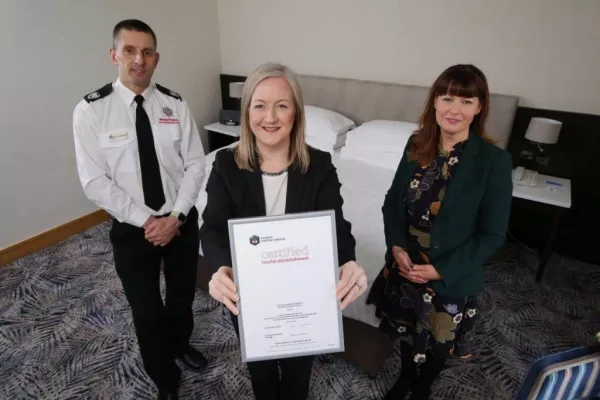Tourism NI has launched a new accommodation certification campaign ahead of peak season to encourage all accommodation providers to get visitor ready this year.
The industry wide campaign, backed by the NI Fire and Rescue Service and Trading Standards, highlights the importance of operating legally and the overall ease of the process.
All tourist accommodation providers must receive certification by Tourism NI in order to operate legally. There are currently 47,556 bed spaces across Northern Ireland in a diverse range of establishments from hotels and B&Bs right through to hostels and bunkhouses.
Close to 4 million overnight trips were taken in the first nine months of 2017 with visitors spending £2.7 million every day. This increase in demand means that all providers must be aware of and comply with certain legislative minimum standards.
Aine Kearney, Tourism NI’s Director of Business Support and Events, said, “Tourism is key to the future growth of the Northern Ireland economy so it is vital that we continue to offer visitors a top quality experience and all accommodation providers have an important role to play here. There has been a 20% increase in certified accommodation from 2016 to 2017, 13% of those certified were trading without a certificate. More importantly, trading without certification could result in legal action against the operator as well as reputational damage to the wider industry.
“The process of applying for certification is very simple and can be completed online. It is cost effective with fees as low as £40 for a four year period.
“Once you are certified, we will carry out one statutory inspection of the property over the four year period. This ensures that all providers are aware of the need to comply with relevant regulations affecting accommodation, can operate on a level playing field, not compromise on quality and give confidence to consumers about our tourism offering.”
The benefits of certification also gives business owners the chance to engage directly with Tourism NI and obtain access to a wide range of services including start-up advice, direction on operational issues, marketing guidance, social media support and free listings on Discover NI’s website.
Sharon Muldoon from NI Trading Standards Service said, “Trading Standards Service fully supports Tourism NI in their efforts to raise this important issue in the run up to a busy tourist period and we have a duty to ensure that there is an even playing field so that honest businesses are protected and consumers are not misled.
“The Consumer Protection from Unfair Trading Regulations bans certain trading practices. Creating an impression that a product can legally be sold is banned as is falsely claiming to be approved by a public or private body. These are criminal offences. Therefore, businesses providing accommodation in NI must ensure that they are certified.
“TSS also wishes to remind consumers to be careful when using third party booking sites. Ensure that the website you are using is legitimate and not a copy- cat site, only send payment through a secure method via the website and use a credit card where possible. Always remember to do your research and check the reviews.”
Northern Ireland is currently the only part of the UK and Ireland that regulates accommodation providers. This campaign aims to boost awareness and understanding of the process for both consumers and business owners.
Geoff Somerville, Group Commander, Northern Ireland Fire & Rescue Service (NIFRS) said, “NIFRS is pleased to work in partnership with Tourism NI on their certification scheme. We want to remind all accommodation providers in Northern Ireland that they have a legal responsibility to ensure that their premises fully comply with fire safety legislative requirements.
“Fire safety legislation is in place to protect the public and ensure the safety of guests and visitors within Northern Ireland. Accommodation providers must ensure that their premises reach the required fire safety standard. They do this by undertaking a fire risk assessment to ensure the appropriate measures are in place to reduce the risk of fire and to enable people to evacuate safely in the event of a fire. A guide, explaining the process, is available on our website (www.nifrs.org/firesafe/guidance.php)
“As the enforcing authority, it’s important that those offering accommodation are aware of their responsibilities and the consequences of failing to meet statutory fire safety legislation may lead to prosecution.”









